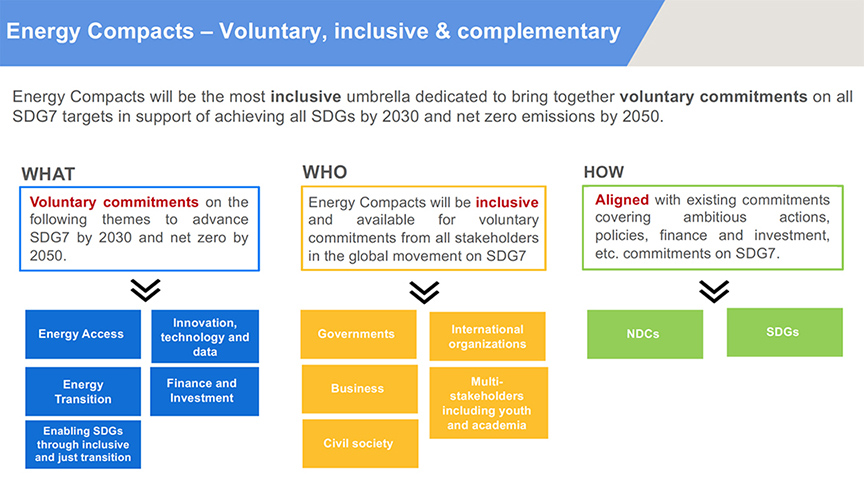Energy Compacts | 30 Jun 2021
Why in News
National Thermal Power Corporation (NTPC) Limited has become the first energy company in the energy domain in India to declare its Energy Compact Goals as part of UN High-level Dialogue on Energy (HLDE).
- The United Nations is set to convene a high-level dialogue (HLD) in September, 2021 to promote the implementation of the energy-related goals and targets of the 2030 Agenda for Sustainable Development.
- NTPC is India’s largest power generating company which is under the Ministry of Power.
Key Points
- Energy Compacts (a platform to unite and connect commitments and actions):
- Energy Compacts are being mobilized by UN-Energy and will continue to be mobilized and updated throughout the current Decade of Action.
- These are ongoing or new commitments with clear, underlying actions that will advance progress on one or more of SDG7’s three core targets.
- SDG7 calls for “affordable, reliable, sustainable and modern energy for all” by 2030.
- SDG 7 three core targets: Access to energy, Renewable energy, Energy efficiency.
- These are voluntary commitments from Member States and non-state actors, such as companies, regional/local governments, NGOs, and others.
- Since affordable, clean energy is a prerequisite for achieving all other SDGs and the Paris Agreement, actions defined in an Energy Compact can be directly linked to Nationally Determined Contributions considered as SDG Acceleration Actions.
- Difference between Energy Compacts (EC) and the Nationally Determined Contributions (NDCs):
- NDCs address Member States’ national climate ambitions and targets that are legally required under the Paris Agreement, focusing on a country’s emissions profile from the economy as a whole.
- EC includes a variety of voluntary commitments, actions, initiatives, and partnerships focused specifically on the energy system and SDG7.
- They will cover the SDG7 targets, including those that are not reflected in a country’s NDCs, such as clean cooking access.
- EC is also open to all stakeholders in the global movement on SDG7, including businesses, organizations, and subnational authorities, and will have annual mechanisms to track progress on the commitments.
- Need for Energy Compacts (EC):
- The energy sector continues to be the most significant contributor to greenhouse gas emissions (GHG) globally, continuing a trend aligned with industrialization.
- Current Situation:
- 789 million people without access to electricity (2018)
- 2.8 billion people without access to clean cooking (2018)
- 17% share of total final energy consumption from renewables (2017)
- 1.7% energy efficiency improvement rate (2017)
- NTPC Energy Compact Goals:
- It has set a target to install 60 GW of renewable energy capacity by 2032. It is also aiming at 10% reduction in net energy intensity by 2032.
- NTPC has declared that it will form at least 2 international alliances/groups to facilitate clean energy research and promote sustainability in the energy value chain by 2025.
UN-Energy
- UN-Energy was established by the UN System Chief Executives Board for Coordination (CEB) in 2004 as the United Nations‘ mechanism for inter-agency collaboration in the field of energy.
- It seeks to act to support countries in achieving SDG7 and the interrelated goals of the Paris Climate Agenda and the broader SDG agenda.
Decade of Action
- In September 2019, the United Nations General Assembly proclaimed the Decade of Action (2021-2030) to deliver the Sustainable Development Goals (SDGs) to accelerate efforts to deliver on the ambitious, universal and inclusive 2030 Agenda.

